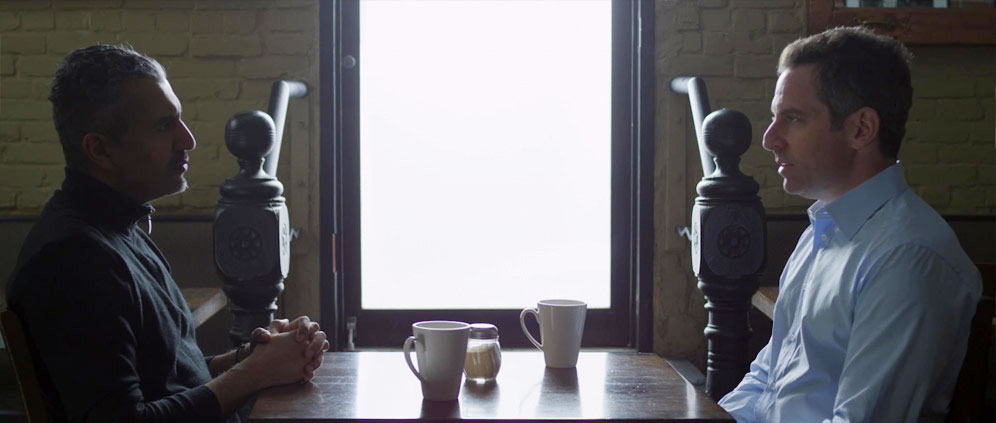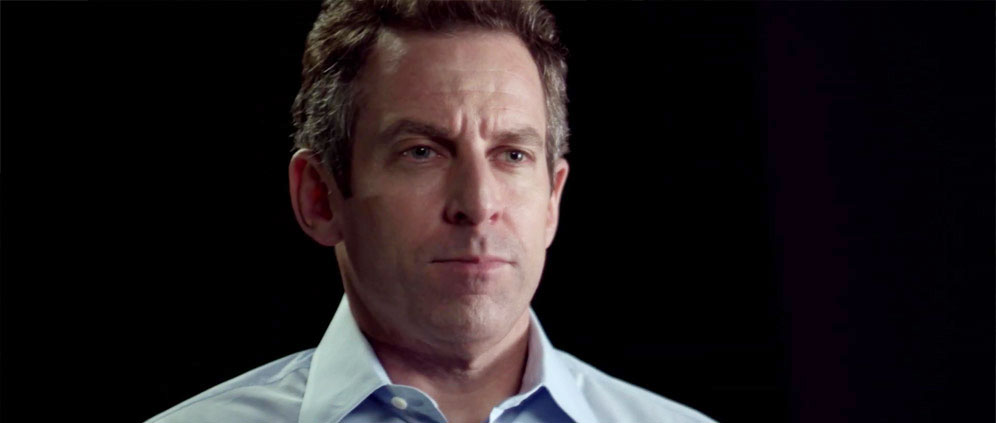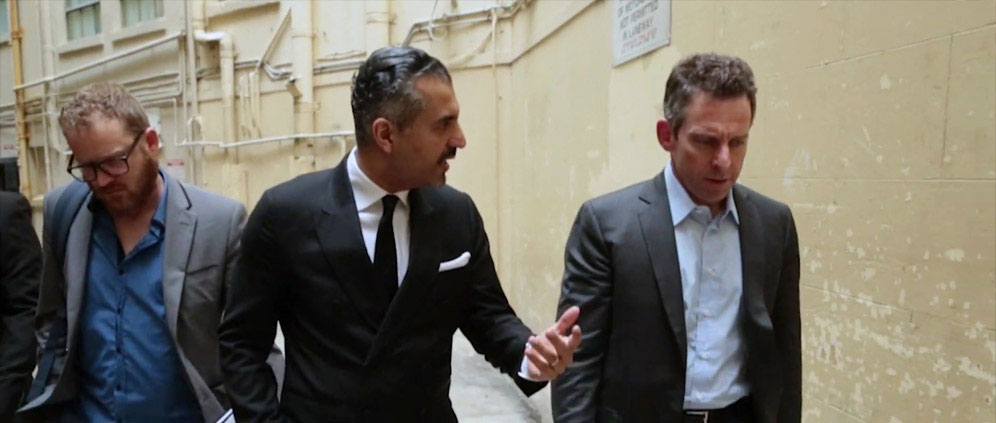| |
"The only thing that permits human beings to collaborate with one another in a truly open-ended way is their willingness to have their beliefs modified by new facts. Only openness to evidence and argument will secure a common world for us." |
| |
Writer, neuroscientist and podcaster Sam Harris |
In the beginning was the word. But the word wasn't God. Thank Christ for that. Fourteen years ago, Sam Harris wrote a book called The End of Faith. I've always found it a curious title, as religion rearing its enormously destructive head on the crystal clear morning of the 11th of September 2001 was the initial motivation for his book. 2001: A Faith Atrocity… How was this 'the end of faith'? It's an important work, one that says we should be able to practically and intellectually push back against bad ideas even if those bad ideas are embedded in a perversely safeguarded religion, an aspect of modern life that is protected by a nervous world terrified of offending ardent believers. It's only a tiny minority of those believers that force the world to justify that fear. All religions were issued a free pass until about fifteen years ago when a group of brave souls said "Hang on, let's look at this rationally…" Sam Harris became, through no conscious effort of his own, allied with three other anti-religion atheists, collectively becoming the media-styled 'Four Horsemen of the New Atheism'. Best known at the inception of the movement was Richard Dawkins, a British evolutionary biologist whose atheism was entrenched and enforced by his devotion to science. His book The God Delusion became a surprising but hugely satisfying bestseller. It's a book I give out free to any passing Jehovah's witnesses. For once, with Dawkins' book, I was able to support the idea that 'he says what we're all thinking but have never been able to say' without the 70's casual racist and sexist thought-processes of stand-ups being part of the argument. Then there is Daniel Dennet, an American philosopher whose output mirrors Dawkins but he's much quieter on the world stage. The outlier-in-chief of these outliers was the great Christopher Hitchens, a man who could and did (successfully) argue that the reputedly nicest person in the world twenty years ago, Mother Teresa, was actually quite the opposite. He died in 2011 and the planet took a big hit that day. He could argue almost anyone under the table, a place he should have been debating from given his unapologetic, hedonistic lifestyle.
Of the four, it's Harris who has consistently taken the fight to the trenches and beyond in espousing why Islam is a mother lode of bad ideas. And this is at no small risk to his well-being. Yes, he's a martial arts student and a gun owner but he's still playing with hell fire and should be commended for his bravery. Jihadists have killed for significantly less push back. His engagement on this most sensitive of topics has produced all too obvious results from people not wanting to participate in debate, people happy to afford all religions absurd respect and shrug Sam off as an anti-Islam bigot. His enemies also deliberately take his words out of context to get others to condemn him – trial by Twitter. Cherry picking from his work can result in some alarming attributed quotes but then sly, disrespectful people can edit a writer's words to mean just about anything. The absurd sensitivity on the far left to any slight or whiff of criticism makes Sam's job close to impossible but he keeps at it. What is his actual job? He has said he thinks publically… Sam Harris' mission is to steer as many as he can get his message to, to live happy and worthwhile, honest lives without superstition and bullshit getting in the way. That's a big ambition. Base human nature is the mythical hydra and winning a fight with one head doesn't mean the others are passively spectating. If Sam manages to cut one head off, (utterly bad taste metaphor given Al Qaeda's methodology but it still works for me) it grows back. Where's Hercules when you need him? I suspect Sam will be fighting for a good long while and in that fight, you need as many friends you can get.

Friendship was probably far from both men's minds at Sam Harris' and Maajid Nawaz's first meeting. It's hardly a spoiler but I would prefer you find out about their journey by watching the film. Born in the UK, Nawaz was a committed Islamist driven to a provocative segment of the Muslim faith by open racism in school and far right British nationalists and after joining Hizb ut-Tahrir, he became a fervent pro-Islam campaigner. He arrived in Egypt for a compulsory year abroad as part of his education (arriving on September 10th 2001) and was arrested because of his ties to the radical group. In prison for four years, he re-educated himself and cites George Orwell's work as a major influence. As soon as he reasoned that his politics were clashing with his faith, it was the beginning of the end of his radicalisation. But as it is with a lot of end-of-pendulum dwellers, Nawaz went fully in the other direction and now is a leading figure in trying to pull Islam back from the middle ages and into the twenty first century adopting the best of liberal values and curtailing the more incendiary passages from the Quran. To choose this as a calling is both noble and frankly asking for trouble. I don't think we've seen the best from this man yet and that's saying something given the good he's promoted in the world so far.
After a rocky start, both men realised that their conversations had taken on a more significant and powerful mantle. Here was a double personification of the very issues that were central to both men's interpretations of the world and of their lives. In short, these ideas demanded to be at the heart of any debate on these subjects and so the book was born. Islam and the Future of Tolerance: A Dialogue is a fascinating and enlightening read but three canny film producers Suzi Jamil, Desh Amila and Aaron Louis made the call that these arguments needed a broader canvas. I suspect the simple but narrow idea that books are for readers and that movies are for everyone gave them some hope that people would be moved by the arguments in the film more persuasively if delivered in a different, more dynamic medium. Astutely directed by Jay Shapiro and Desh Amila, the film of a dialogue between two smart men could not be a pointed My Dinner With Andre. B-roll is the industry phrase for material shown that alludes to or plainly illustrates the subject being discussed. It is shot and cut in to avoid what's believed to be the Achilles heel of documentary – the 'talking head'. See BBC 4's extraordinary Inside The Medieval Mind. The filmmakers had no archive to draw on (duh) and had to conceive the entire four part series visually with as few 'talking heads' as possible. I was so impressed I wrote the producer a fan letter. I know how difficult this stuff is. Some B-roll can be so on the nose that it's risible but if it's directed and shot cleverly, it can also be a seamless representation of a point or subject. The rope of a tightrope walker is often presented in Islam and the Future of Tolerance but it is done so artfully, is beautifully lit and somewhat mysterious at first. The tightrope walk is of course the ultimate metaphor of what the film is trying to achieve. But when it comes to talking heads, I cannot imagine two better heads to watch. I find it very interesting how the two men were shot individually and together. On his own, Maajid has been sat in the middle of an empty warehouse with a teal lit background (and we all know the presence of teal makes flesh tones stand out: Film 101 in 2018). There are also some graffiti covered columns in frame. It is a bleak but soothing environment complemented by Maajid's brown and grey tasteful attire. With Sam Harris on the other hand, whose interviews are located in quite a few places like coffee shops and cinemas, in one location the directors have gone on full Manhunter Hannibal Lecter mode. It's a similar warehouse but all white with bars on the windows and Sam is front and centre with a few occasional cuts to the side. Maajid's interview is shot far more fluidly with jump cuts that feel natural because we are in the world of ideas. I really must temper my old film training and not see jump cuts as crimes against humanity (which of course they are by the way unless the movie's directed by Paul Greengrass).

The film's visual and structural coup is to present both men in situ and then slowly isolate them bringing their backgrounds down in light until both are backgrounded by a stark black. The deft editing by Karen Johnson and co-director Shapiro then places them together (both against black) as if they are having an unusual conversation nose to nose with only the tightrope taut between them. Full figure and mid shots slowly become close ups which is the editorial equivalent of pulling your audience towards the screen with a piece of string. Both men are cut, turned to face each other as the film's conclusions are realised. It's very satisfying and commendable to have filmmakers thinking about the presentation of what is essentially a conversation. Bravo. If you are going to shoot Maajid Nawaz and Sam Harris, you need profound foundations of creativity to match the articulacy and intelligence of the 'stars' and the filmmakers have done both men proud. Also on the plus side are the graphics. They clarify some speech and show representations of ideas. Timed so well in the film, these graphics are clean and superbly animated. The timing of the presentation of words is exquisite.
If there are elements in the film I missed knowing the book and something of both men and their efforts, it would be to give Sam's background a minute or so more. Maajid's own back-story is so extraordinary, it was good to spend that time with him (let's face it, he's superb on camera). I would have liked to have broadened Sam's character just a tiny bit more. A tiny quibble. An even tinier quibble… True story. I shot my first film on 16mm. When you plan a dissolve or a mix from one shot to the next, you have to make sure you have enough 'tail' of both outgoing and incoming shot so that the mix won't encounter a part of the tail of the shot that would give the mix a problem. I held a shot on a typewriter and the intention was that the typed word would then dissolve or mix to the actual location. All went well for the first second of the two-second mix. When shooting the typewriter, I'd pulled out the paper from the roller with a flourish and had quite forgotten this. The paper disappearing meant that as my dissolve was ending, the white of the paper fading into shot two was abruptly replaced by the black roller – only for six frames or so but it was horrible, the worst mix but it taught me never to make that mistake again. In Islam and the Future of Tolerance, at about 42' 54" after the graphic and Maajid's voice saying "Spot on," we see a semi-faded frame or two of Maajid superimposed over Sam's close up. It's just a few frames but I'm at a loss how this crept in to the finished film as we were coming in from black. I'm sure there's a reason for it but am pretty sure it wasn't intended. Hey, if that's all I have to say negatively about this educational, creative and erudite work urgently needed then it's time for you to download it.

I have nothing against iTunes (this is a lie). I cannot get frame grabs because of the DRM encoded into the file and I cannot scroll through a scene frame by frame as is my want as a fellow filmmaker and film champion. The grabs are from the YouTube trailer where of course this phantom superimposition is not featured. Forget all that. If you are at all interested in how human beings can move forward despite the lorry loads of historical hysteria religion has dogged us with, then Sam and Maajid are your very best guides. Highly recommended.
Postscript: From a modicum of research, Islam and the Future of Tolerance is available in the UK only as an iTunes download (Grrr, Arrgh). Some crew members and Kickstarter donors have chosen to have their surnames 'whited' out for anonymity. This starkly illustrates what a difficult subject this is just to address let alone make a film about. Ask Theo van Gogh… Oh wait, you can't. He was murdered in 2004 (I was in Amsterdam at the time) for making his own anti-Islam film with Ayaan Hirsi Ali. Finally, I strongly urge you to check out Sam Harris' podcast, Waking Up. These have hugely inspired me, prompted me to look for wisdom in places I'd never have looked before, pushed me into reading books by men and women I would never have picked up let alone read. Once you identify with a political 'side', the worst that can happen is that everything from the other side is blanket labelled as wrong or bad. This is wrong and bad. This is a link to a man who voted for Margaret Thatcher and wore a Regan 80 badge in a British comprehensive. His podcast with Sam Harris is one of the most entertaining two and a half hours my ears have ever heard…
* https://www.youtube.com/watch?v=ACDqFL8mW3s
|